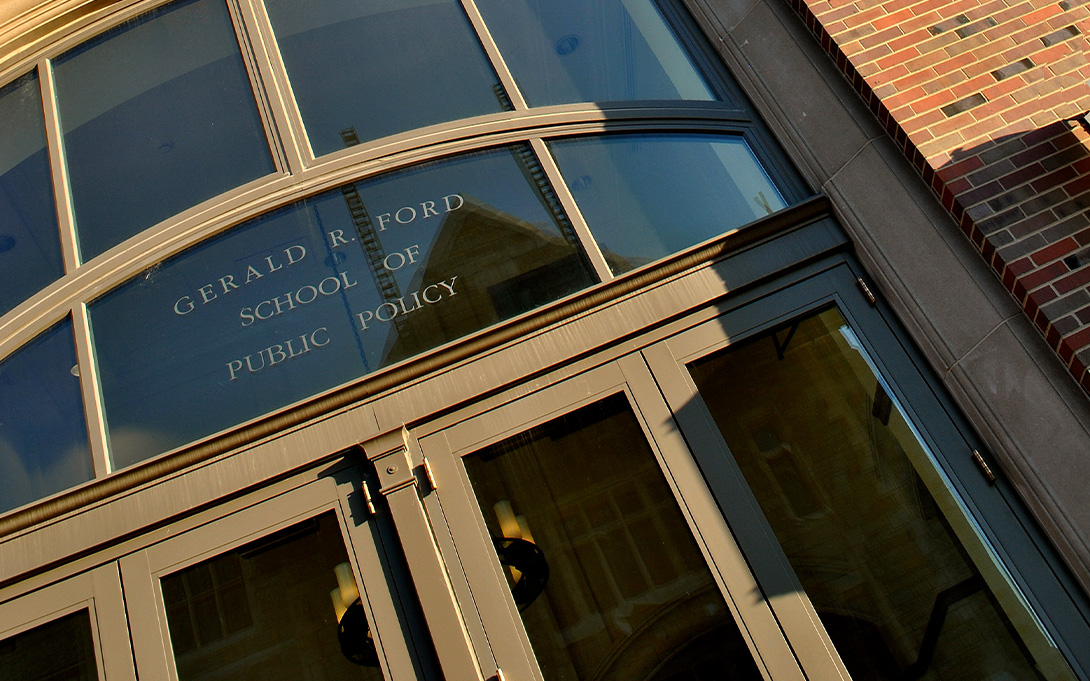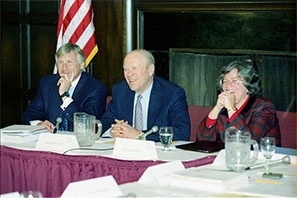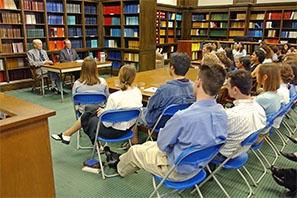
In December 1977, at the annual party of the Institute of Public Policy Studies (IPPS), a young graduate student named James McIntire (MPP ’78) found himself chatting with the Institute’s director, the political scientist Jack L. Walker, Jr.
Out of the blue, Walker said: “Jim, what would you think if we named the Institute for Jerry Ford?”
Professor Walker had been nursing the idea ever since the Republican Gerald R. Ford had lost the presidency to the Democrat Jimmy Carter the year before—and especially since Ford had signaled his interest in teaching at his alma mater.
Walker was hoping to expand IPPS’s size and influence. He thought a closer association with U-M’s most prominent alumnus might be a force-multiplier.
He was well aware that Ford’s pardon of his disgraced predecessor, Richard Nixon, made him persona non grata among many liberals—thus his question to young McIntire, who had recently left the U.S. Senate staff of the Democrat Hubert H. Humphrey.
McIntire said: “Sure, you can do that, Jack. And then when I graduate I’ll call a press conference and burn my diploma on the steps of Rackham.
“What does it say about policy that we would name the school after him? ‘I pardoned a crook’?”
They changed the subject.
In time, proponents believed, Ford’s reputation for integrity and bipartisanship would far outshine the passing storm over the Nixon pardon. But it would take nearly a quarter-century and a new vision of public policy at Michigan for Walker’s notion to be realized.
The key obstacle was not the opposition of liberals like McIntire. It was the ex-president himself.
A number of programs in higher education were associated with the names of former presidents, and some had been jump-started by congressional appropriations. But as a deficit hawk in an era of endless federal red ink, Ford said he wanted no funding from Congress for any program with his name over the door.
He had chosen U-M as the site of his official presidential library (with an affiliated museum in his home town of Grand Rapids, which he represented in Congress for decades.) But the construction of the library and museum would be paid for with private donations. Only their day-to-day operations would be funded by the National Archives.
In any case, U-M officials were leery of developing two Ford projects—the federal library and a public-policy school—at the same time.
So the idea of a Ford School at U-M went back into Jack Walker’s filing cabinet.
In the 1980s and early ’90s, IPPS remained a small and little-known enclave in U-M’s sprawling empire of colleges, schools and research centers. Its offices were split between Rackham and a downtown office building, then later occupied a floor in the Econ Department’s building. Its faculty had tenure lines in separate departments. There were only a handful of graduate students and no undergraduates.
Meanwhile, schools of public policy elsewhere were building endowments and new facilities—tough competition for any effort by Michigan to recruit the best faculty and students.
In 1995, led by Professor Edward Gramlich, IPPS made its bid for autonomy, and the Regents approved an upgrade. IPPS would hereafter be a free-standing School of Public Policy. A committee was named with the chief aim of building an endowment.
At the same time, to the surprise of Republicans and Democrats alike, an expanding economy did away with the federal deficit during the Democratic administration of Bill Clinton.
So much for President Ford’s caution on that score.
Ford had been as active an alumnus as a university could hope for. He visited the campus to teach one-off classes and meet with students and professors. He dined with residents of Martha Cook, hobnobbed with the football team, and participated in any number of forums and conferences at the Gerald R. Ford Library.
Then, in 1999, when the University was defending its affirmative-action policies against lawsuits that went to the U.S. Supreme Court, Ford took the side of his alma mater in a widely-read essay in the New York Times. He recalled his friendship with Willis Ward, the African-American U-M football star of the 1930s who was benched when Georgia Tech’s team refused to play if a black player took the field.
Ford declared that “tolerance, breadth of mind and appreciation for the world beyond our neighborhoods . . . can be learned on the football field and in the science lab as well as in the lecture hall, but only if students are exposed to America in all her variety.”
His “op-ed” bolstered his standing in Ann Arbor. And it was published just as a new dean was joining the School of Public Policy.
In talks with U-M President Lee Bollinger, Rebecca Blank—a professor of economics at Northwestern, then a member of President Clinton’s Council of Economic Advisors—had asked if Michigan meant to make its School of Public Policy a national leader.

Bollinger, Ford, and Blank as U-M Regents approved the naming, 1999.
She said the school must have its own professors. It must expand its doctoral program and create a curriculum for undergraduates. It needed new facilities. And to bring all that within reach, it must raise money—lots of it.
Bollinger said yes to each point. So Blank took the job. No sooner had she arrived than she said the time had come to name the School for Gerald Ford.
The idea had remained in the air since Jack Walker’s day. (Walker had died at 55 in an auto accident in 1990.) Any reservations among the faculty about the Nixon pardon had faded.
“My faculty colleagues thought it was a fine idea,” recalled Paul N. Courant, professor of economics, a past director of IPPS and later U-M’s provost, among other leadership roles. “And although, as a group, faculty in the public policy school are more liberal than members of Congress, they’re probably less dogmatically liberal than members of, say, the Anthropology Department.”
A prominent Democrat on the board of regents, Rebecca McGowan, also pushed for the plan.
“She believed in Michigan and she believed in the School,” said Michael Staebler, the prominent attorney who was then McGowan’s husband as well as chair of the committee charged with raising an endowment. “And if the School was named for Joe Schlabotnick, nobody was going to know who we were talking about.”
But first the former president had to agree.
Dean Blank knew it was a delicate “ask.” Ford retained strong ties to old friends in Grand Rapids. They were potential competitors as fund-raisers, since they had long backed both the Gerald Ford Museum and the president’s foundation.
“Our thought was: ‘They have to be with us on this,’” Blank recalled. “‘If we’re on opposite sides, the president is not going to agree to this.’”
So she and Susan K. Feagin, then U-M’s vice president for development, made the pilgrimage out I-96 to meet with Marty Allen, chair of Ford’s foundation, and other Ford allies. To their relief, the friends were in favor. They called Ford, who said he would welcome a call from Dean Blank.
She spoke with him about what his name might mean for the School, the University, and his home state.
“And immediately after that conversation,” she said, “I got the green light.”
“She can be quite compelling when she makes an argument,” said Catherine Shaw, then the School’s communications director, now U-M’s associate provost for academic and faculty affairs.
Ford at Lorch Hall with Policy Students 2003

Blank saw three enormous advantages to naming the School for Ford.
First, the president’s name was all but synonymous with “Michigan.” So it would instantly identify the School with the University in a way that even the wealthiest donor’s name never could.
Then there was his extensive network of wealthy friends and associates. With Ford’s help, their doors and checkbooks would open to U-M fundraisers.
Finally, and most important, there was the meaning of Ford’s name in American public life.
“You want a name that will last forever,” Blank said. “People will always know who Gerald Ford was. He’s had an important place in American history.
“And I will say this more strongly now than I would have before I met the man — I read a lot of biographies and books about Gerald Ford; I met him and got to know him and his family; and the School will never, ever be embarrassed by the fact that they took Gerald Ford’s name. That’s not unimportant. This is someone you can be very, very proud of having as the main name on your School. He wasn’t just the president, but a man of enormous integrity and presence.”
On September 12, 2000, a crowd of 2,500 gathered at Hill Auditorium for the official naming ceremony. Henry Kissinger, Ford’s Secretary of State, gave the keynote address.
Ford himself told the audience: “There is no higher honor for a man than to have a school bear his name, especially when it is dedicated to public service.”
Naming the School for Ford was perhaps the indispensable step in a chain reaction of growth, including the expansion of the doctoral program, the creation of a two-year undergraduate curriculum and increased engagement with policymakers at all levels of government.
Those expansions fueled the drive for a fine new building. There, too, Ford played a key role in the campaign to raise funds for the construction of Joan and Sanford Weill Hall at the highly conspicuous corner of State and Hill. (The Ford School later sought and received two federal grants, but they were for programming, not construction.)
“This is a sign it was the right idea,” said Blank, who, after ten years as dean and four years in leadership roles at the U.S. Department of Commerce, was named chancellor of the University of Wisconsin in 2013. “The name ‘Ford School’ got picked up immediately. There were still a few alums who would show up and refer to it as ‘IPPS,’ but they would almost immediately correct themselves. It signaled ‘Michigan.’ It signaled ‘policy.’ There are a lot of ‘institutes of public policy’ out there. That could be anywhere. This said ‘Michigan.’
“It’s hard to suss out what the effect of that is. But creating that name at the same time that we were building the School — the two are entwined in some important ways. I would like to believe we did a lot of things to build the reputation of the Ford School over those years. But the naming was at least as important if not more important than some of the more substantive, programmatic things we did.”
In the meantime, James McIntire, the young grad student who had threatened to burn his diploma if IPPS were named for Ford, had earned his Ph.D. and joined the public policy faculty at the University of Washington. In 1998 he was elected to the Washington state legislature.
When the School of Public Policy took Ford’s name, McIntire still had his doubts.
Then he spent 10 years as a Democratic state legislator and another eight as Washington’s elected state treasurer. In that time, he said recently, “I developed kind of a passion for practicality and getting things done.” His support across the political spectrum was such that after one term as state treasurer, Washington’s Republicans asked him to run for a second term as an independent. When he remained a Democrat, the GOP decided not to nominate anyone to run against him.
By the time he left office, his opinion of Gerald Ford had changed.
“What I learned from President Ford didn’t have much to do with policy,” McIntire said. “It was more about statesmanship. Pardoning Nixon probably cost him his presidency. He was trying to turn the nation from retribution to reconciliation. Frankly, I don’t know that he was very successful in doing that. But it was absolutely the right thing to do. And in doing it, I think he taught us something about statesmanship.
“I would say today I’m proud to be a graduate of the Ford School.”
by James Tobin
Below is a printed version of this edition of State & Hill, the magazine of the Ford School. View previous editions.